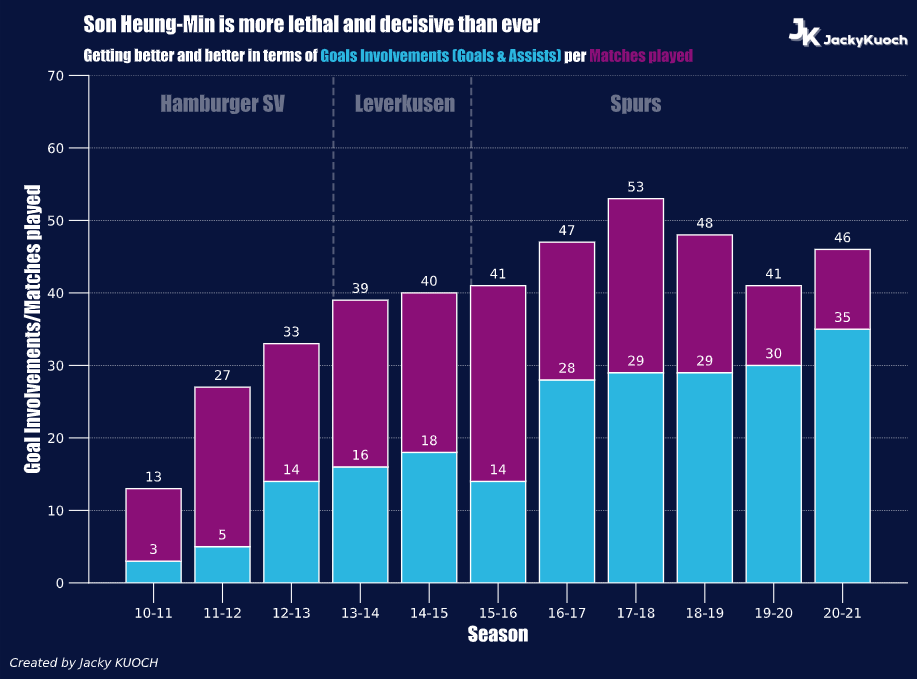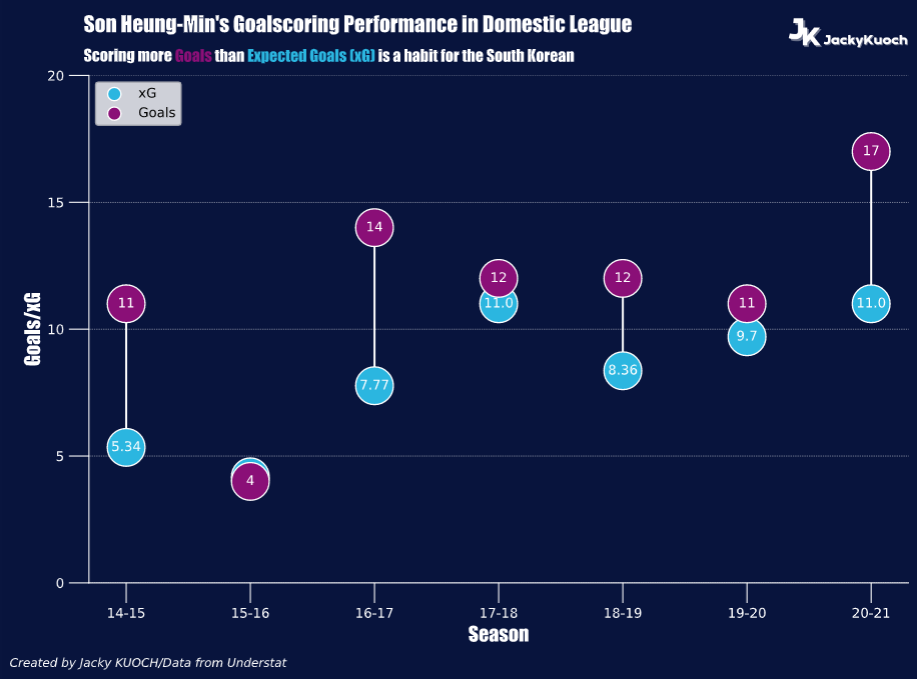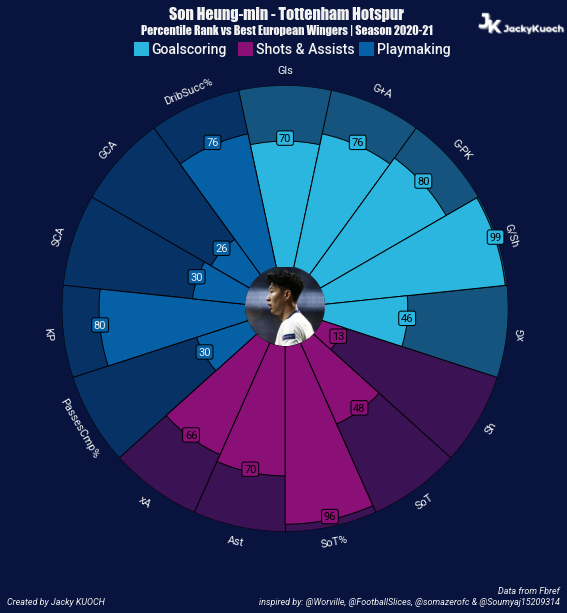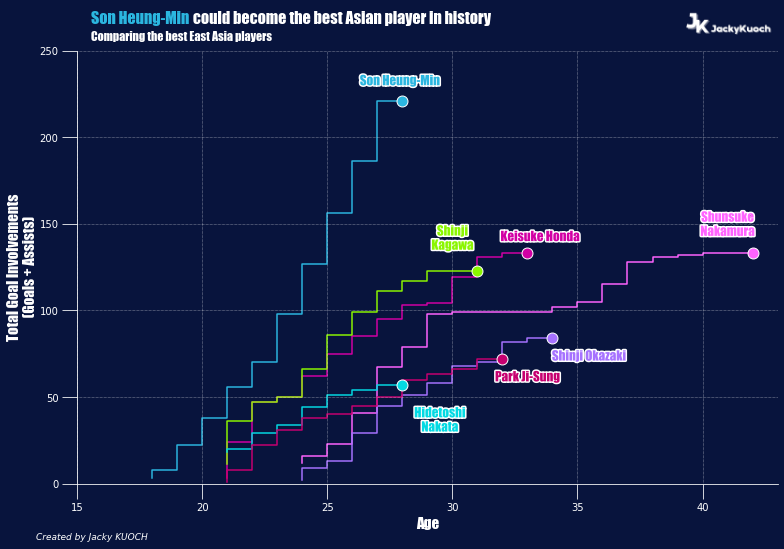August 28th 2015. After two seasons at Bayer Leverkusen where his performances caught the eye of multiple scouts, Son joined Premier League club Tottenham Hotspur for €30 million, a world record transfer fee for an Asian player. It's at Tottenham that Son became Sonaldo/Sonny for the connoiseurs.
However, debut season at Spurs was not a fairy tale for Son. The Korean showed a glimpse of his talent during various games but many made critiques about his lack of scoring and about Son not fitting the Mauricio Pochettino football philosophy. Rumours of his departure flourished but Son was instead given a chance to fight for his place at Spurs. This was a milestone in Son's ascent to the heights of European football.
From South Korea to Europe
Son started his football career at the FC Seoul academy in 2002, after South Korea's wonderful journey at the FIFA World Cup which took place in Korea and Japan. Son, 10 years old at the time, began training with his brother under the care of their father, retired football player, who taught them discipline and the value of hard work. But in 2008, Son decided to leave Korea for Germany and join Hamburger SV's youth academy to complete his formation.
As a matter of fact, Son, 16 at the time, had the chance to integrate the Korean FA Youth Project and moved to Germany. A move that demonstrated his determination to build a successful career in Europe even though he did not speak German or English when he arrived. At Hamburger SV, Son played a few games during his first two seasons managing to score 8 goals in 40 games while learning German.
Once he was settled and more used to professional football in Europe, Son started to show his abilities on the field and his third season at Hamburger was a breakthough season for him. First, Son became a starter following the transfers of the teams's strikers. The Korean participated, during this seasons, in 33 games including 31 as a starter while he only started 19 times during his first two seasons. He managed to get involved in 14 goals during that season, which is pretty impressive for a wide attacker.

This was his last season at Hamburger SV as Bayer Leverkusen confirmed Son's transfer on 13 June 2013 for €10 million. Son adjusted quickly to his new team where he was immediatly named a starter, and participated in 16 goals during his first season. He also discovered the UEFA Champions League and the thrill of European competitions during his two years at Leverkusen. Just within two seasons, Son performed very well and produced multiple eye-catching performances while staying consistent in terms of matches played and goal involvements. This drew interests from many clubs including Tottenham Hotspur.
"The most expensive Asian player of all time."
His transfer fee to Tottenham of £22 million made him the most expensive Asian player of all time showing how promising was the South Korean. Expectations came with this transfer, such a fee for an Asian player raised some questions about his ability to fit in Pochettino pattern and his potential. But, from his time at Leverkusen and given the qualities he already had and his young age, there was reason to be optimistic about the Korean becoming a key player in the Spurs system. Indeed, after a first season with 14 goal involvements, which sounded promising for some, but disappointing for others, Son actually showcased his true talent during his second season.
His second season at White Hart Lane surpassed his debut campaign in England with 28 goal involvements, twice the number of the previous season. Since that 2016-17 season, Son never went under 28 goal involvements in a single season while participating at least in 41 games, and even reached 35 goal involvements during the 2020-21 season. He became the top Asian goalscorer in Premier League history during the 2017-18 season breaking the record set by Park Ji-Sung at Manchester United.
Huge pressure and expectations
Coming to Europe meant a lot of sacrifices for the Korean. Son broke several records in his teams. He was the youngest Hamburg player to score a goal in the Bundesliga at 18. He became the fifth South Korean footballer to achieve double digits in goals in Europe. He was the highest transfer fee in Leverkusen's history at the time. One of the most noteworthy record is obviously his transfer to Tottenham for £22 million.
"Son always outperforms the expectations."
Such tally inevitably leads to high expectations. From a data point of view, we can study expectations throught Expected Goals (xG). xG, a new football metric, measures the quality of a shot based on several variables such as assist type, shot angle and distance from goal. Adding up a player epected goals can give us an indication of how many goals a player should have scored on average, given the shots they have taken.

As we see on the plot, Son almost always scored more goals than he was expected to do since his last season at Leverkusen. From what we see, first season at Tottenham (2015-16) was not an easy one as Son only scored 4 but that is due to the fact that he was not a regular starter during that debut season at Spurs. However, the following season, the South-Korean produced a spectacular season with 14 Premier League goals, almost the double of xG predicted for the winger. Since this season, Son's total number of goals never fell under a double-digit figures and always outperformed the expectations despite the changes in coaching staff and teammates.
One of the best wingers in Europe
Although many changes happened in Son's career, the South Korean still found a way to improve his game. Among these changes, we can mention Tottenham's move from their historical stadium of White Hart Lane to the freshly built Tottenham Hotspur stadium or the appointment of José Mourinho as Spurs manager following Pochettino poor start to the 2019-20 season. When speaking of Son, who can forget his memorable pursuit of military service exemption. Indeed, South Korean citizens are required to perform a 21 months compulsory military service between the ages of 18 and 28. Fortunately, Son led the South Korean national team to the gold medal in 2018 Asian Games, after many tries, which guaranteed the entire squad's exemption from military service.
"Season after season after season Sonny is showing how good he is. [...] But Sonny is Sonny, everybody knows what he now needs to do to go to a next step - nothing." José Mourinho.
While being captain of the South Korea national team, Son also plays a major role at Tottenham where he became, through hardwork and perseverance, a fundamental key player. A player capable of playing in any forward position with an explosive pace, a clinical finishing but also the ability to provide assists for teammates. Let's take a look at a stats comparison of Son versus the best European wingers and during the 2020-21 season. I collected statistics demonstrating his goalscoring, shooting, passing and playmaking abilities and looked at where Son stands among the very best.

When looking at his Goalscoring per90 stats, we see that Son is pretty good compared to the others as his percentile scores are all above 70 except the Expected Goals (xG) which actually shows how impressive this season was for the South Korean and how much he outperformed the expectations. His Goals/Shots ratio is impressive as he ranks at a 99 percentile score which makes him almost the best forward in Europe in terms of Goals per Shots confirming how lethal is Son in front of the goal.
Because, as we look at the Shots & Assists percentiles, we see that Son is not a forward taking a lot of shots compared to the others but he still managed to make it to a 70 percentile score in terms of Goals scored. He stands 96 in percentage of Shots on Target, meaning that Son is really precise when shooting and looks for other options when he believes he doesn't have a chance to score. Indeed, having a look at his Assists percentile score, he gets the same score that he gets in Goals, which is a 70 percentile score. Son has always been regarded as a fanstastic skilled player and these two stats show how true this is.
We just said that Son is a clinical finisher, at ease with the ball but also good at finding his teammates. His successful dribbles percentage confirms that statement. However, he is not the best at creating Shot actions and Goal actions. As we mentionned Son is able to assist his teammates but in the past, situations happened during which he kept his head down, ran at goal and took a shot, ignoring therefore his teammates. He worked on that during this season, where he delivered no fewer than 14 assists even though he is not known for his passing as his passing completion percentage has hovered around 80% during his time at Spurs. With José Mourinho's appointment, Son became even more important in the system explaining why he has so many Key Passes (KP).
One of the best Asian player in history
Sonny has emerged as one of the Premier League's most prolific forwards over the past seasons. While being one of the best, he is still gaining depth in his skillset as his journey continues. A journey allowing him to be regarded as one the best Asian players in European football history. He is now a global brand able to pique worldwide brands' interest and is considered an icon in his home country and in Asia.
To see where Son stands in history, I gathered data about the best East-Asian players in history regarding goal involvements meaning: goals and assists. The players include:
- Shinji Kagawa, the Japanese midfielder who played for Borussia Dortmund and Manchester United. Described as a technically gifted player with a really good sense of passing and positioning. His abilities make him a key player in a playmaker role where he can distribute and score goals himself. Kagawa holds the record for most appearances and goals by a Japanese player in UEFA club competitions.
- Keisuke Honda, the versatile Japanese attacking midfielder known for his accuracy from bending free-kicks, powerful striking and dribbling skills. Honda has played for many clubs around the world, but his ability to play as a winger, a false nine or as a deep-lying playmaker allowed him to play for CSKA Moscow and Milan.
- Shunsuke Nakamura, Japanese attacking midfielder. Nakamura played in Europe with Espanyol, Celtic and Reggina. At Celtic, he became one of the best Asian players to have ever played in Europe; nominated for the 2007 Ballon d'Or, named Scottish Player of the Year and SFWA Footballer of the Year. Nakamura has 98 caps and 24 goals for the Japanese national football team.
- Shinji Okazaki, the Japan national team top active goalscorer and third all-time in team history with 50 goals. The forward played most of his career in Europe in clubs like VfB Stuttgart, Mainz 05 and obviously Leicester City where he won the Premier League after a wonderful run where the Foxes beat all the expectations.
- Park Ji-sung, the most successful player in Asian history, having 19 trophies in his career. Born in South Korea, the midfielder was able to play anywhere across the midfield and was known for his exceptional fitness level, discipline, work ethic and off-the-ball movement. These qualities made him a key player in Manchester United where he won 4 Premier League titles and a UEFA Champions League. Often considered as one of the most underrated player in history, Park was the perfect team player willing to sacrifice himself to create spaces for the likes of Ronaldo and Rooney. The latter said that Park was as important to the Man United side as he and Cristiano were.
- Hidetoshi Nakata, widely considered to be one of the greatest Japanese players of all time. The midfielder, played most famously for AS Roma, was known for his technical ability, agility, vision, passing, and his ability to make attacking runs into the penalty area and score goals.

At age 28, Son already has 221 direct goal involvements with 151 goals and 70 assists. Looking at the total goal involvements at different ages for these players, Son really stands out as he is the only one above the 150 GI mark even though he is only 29 now. If the South-Korean can maintain his overall output means, he could reach levels that will be hard to match for the upcoming Asian footballers.
According to the data, Son is therefore on course to become the best Asian player in history. Unfortunately, his lack of trophies tarnishes his resume. Son has been starved of trophies to this point in his career. Son could reach the heights of players like Park Ji-sung or Kagawa who won many trophies at a club level but to do so, he needs silverware which will take him to the next level in his career.
On July 23, Sonny has signed a new four-year contract with Tottenham, which will run until 2025. Let's hope that the South-Korean will be able to lead the Spurs to a title and finally fill his trophy room.